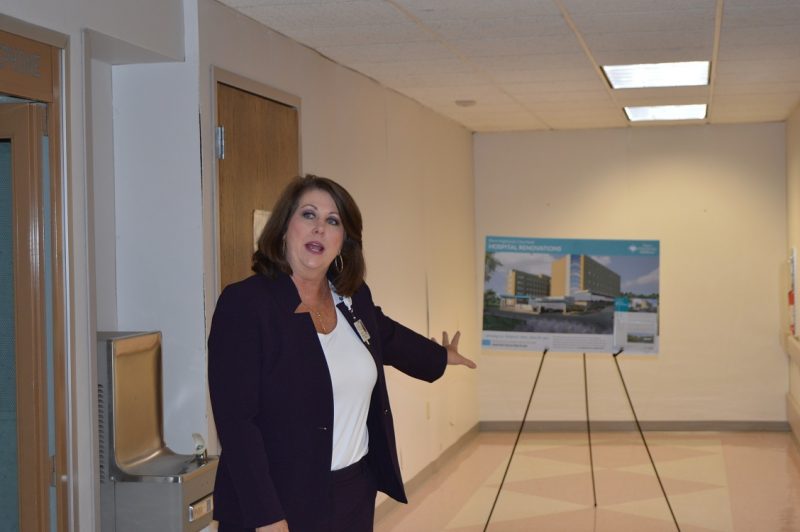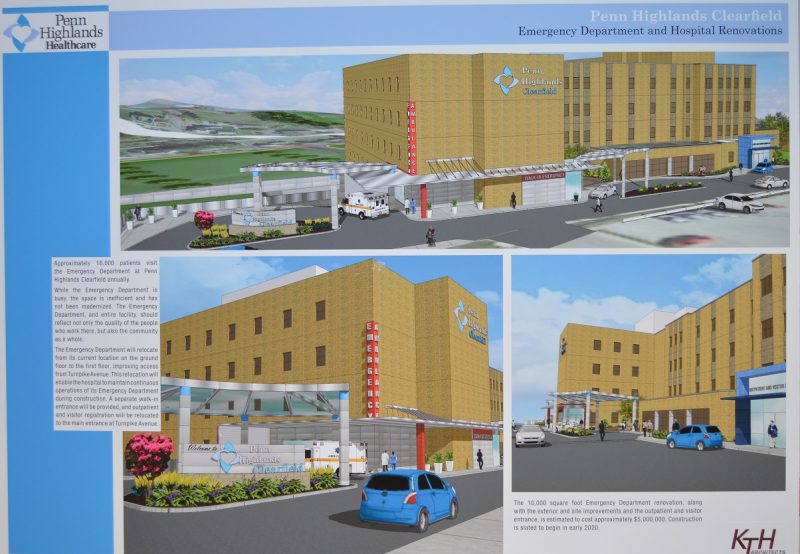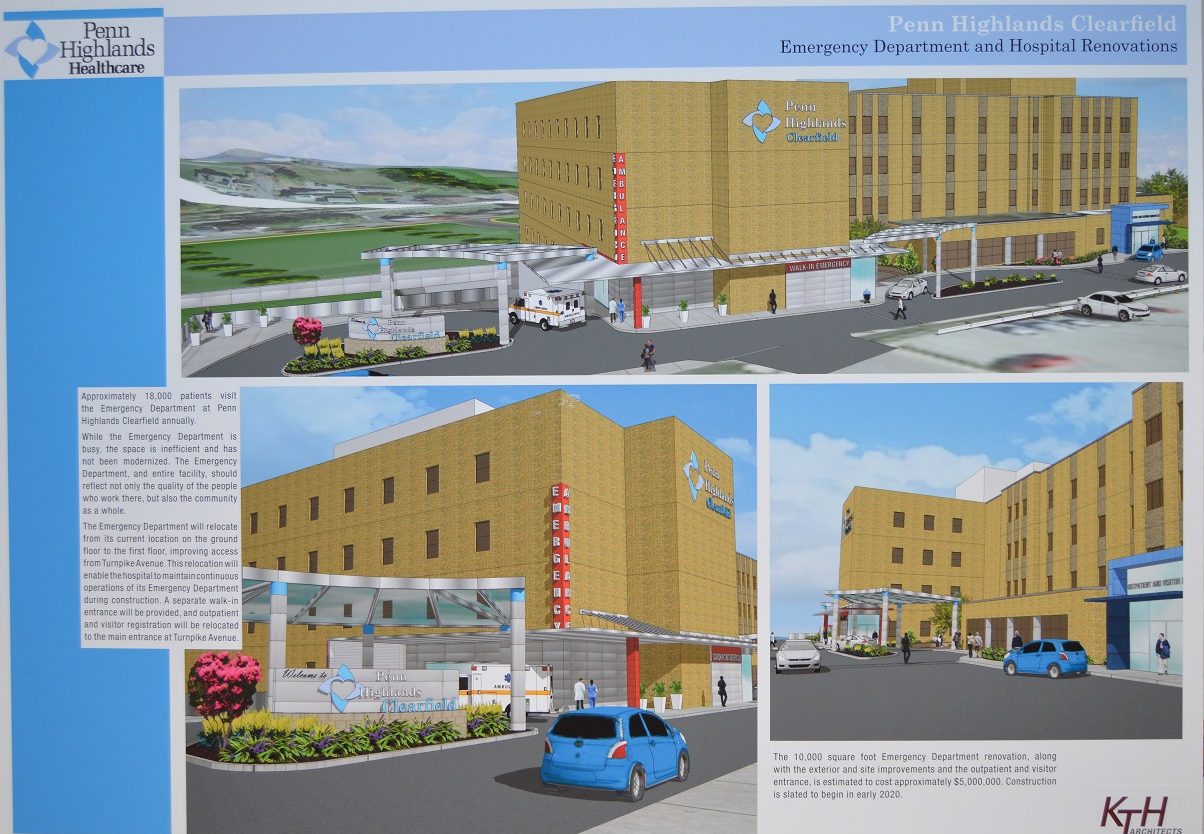
CLEARFIELD – Penn Highlands Clearfield is continuing to provide quality healthcare for the Clearfield area.
At a Community Luncheon Tuesday, administrative staff at the hospital discussed the many changes they have implemented over the past year and outlined future projects.
First to speak was Rhonda Halstead, president of Penn Highlands Clearfield, who talked about the goals she set for PHC in 2019-20.
She said the entire hospital staff has been working toward financial stabilization of the hospital, improving the culture at Penn Highlands Clearfield, establishing support in the community and regaining community trust and developing a highly functional leadership team.
To establish financial stabilization, Halstead said the hospital has reviewed salaries, costs of supplies and examined ways to increase revenue.
Halstead said one of the trends they noticed was that hospital staff was not taking their meal breaks. While that doesn’t seem like a lot, Halstead said by ensuring the staff were getting their breaks, it reduced overtime costs and saved about $15,000 per pay period and $400,000 annually.
She added that ensuring the staff were taking their breaks also helps maintain good morale and keeps the staff from becoming overly fatigued during their shifts.
Halstead said the staff has been working to add more physicians to PHC. She said the hospital recently welcomed a general surgeon, a general cardiologist and a pulmonologist to provide enhanced care to patients.
Halstead said while there is still a lot of work to go, the hospital has increased revenue by $2.8 million over the previous year.
To improve the overall culture at the hospital, Halstead said the staff has been working to improve transparency, to implement a system of recognition and rewards, to inspire, to communicate purpose and passion among staff, to share success and work together on challenges, to cultivate strong relationships and a team atmosphere and to stay true to the hospital’s core values.
Halstead said a key to these changes is to transform the hospital’s leaders into engaged, contributing go-to leaders and proceed to create a legacy within Penn Highlands.

Steve Fontaine, chief executive officer of Penn Highlands, discussed the upcoming renovation projects not only at Penn Highlands Clearfield, but also at all other local facilities within the Penn Highlands community.
The renovations include:
- The expansion and renovation of the Penn Highlands DuBois East Campus’ Behavioral Health Hospital. The project will create a 126-bed hospital to provide behavioral health services, a walk-in urgent care center for behavioral health issues, outpatient care, child/adolescent care, adult care and drug and alcohol detox and rehabilitation.
- The construction of an emergency department/patient tower at Penn Highlands DuBois West Campus, which will allow the department to become a Level III trauma center. The tower will include 30 emergency department bays, a 12-bed observation and clinical decision unit, a four-bay vertical care area and two large trauma rooms. The tower will provide a combination of traditional medical/surgical patient rooms, which will be single-patient with private bathrooms.
- A five-story annex at Penn Highlands DuBois West Campus will add a new kitchen and cafeteria, a physicians’ lounge and administrative wing, an expanded maternal and child care center, an ambulatory surgery center, and an expansion of the heart center and cardiology services.
- A new healthcare Center of Excellence will be built onto the existing Penn Highlands West Campus, which will create a facility for orthopedics, pediatrics and women’s health. The center will provide offices for orthopedic surgeons, an outpatient rehabilitation center for physical, occupational and speech therapies, x-ray and imaging services and pain management care.
- The Emergency Department at Penn Highlands Clearfield will be renovated and modernized to provide easier access to patients and additional room for staff. The renovations include improved ambulance access and relocation of the main entrance.
- A medical office building will be constructed at Penn Highlands Brookville. The building will house primary and specialty care “super clinics” for multiple providers. The new building will be located adjacent to the main hospital for convenient drop-off and pick-up of patients and additional parking.
- Pinecrest Manor in St. Marys will be modernized with new rooms for residents, a solarium, a multipurpose room and modernized furnishings, window and accents.
- A new two-story Q-care walk-in clinic will be built in Monroe Township, Clarion County to provide specialty care and a “super clinic” to house multiple providers. The facility will provide virtual care using innovative technology to reach out and see patients and provide care any time, from multiple locations. The new clinic will minimize the need for patients to travel for specialty care.
Next to speak was Dr. Istikram Qaderi, who outlined a six-pillar strategy to provide improved care to patients. Those pillars include quality, safety, people, growth, finance and service.
Dr. Qaderi said his goals are to receive five-star ratings in all these areas. He said the hospital will be working with patients and staff to find out where improvements need to be made.
He said the hospital will look to learn from other successful organizations and celebrate success when it happens.
The final speaker was Dr. Russell Cameron, who discussed the future of the hospital and the work being done to encourage innovative technology.
Cameron said over the years, there have been numerous changes in health care for rural areas. He said years ago, patients relied on their family doctors for all their health care needs.
He said now, there is a greater need for specialists. He said patients are more mobile and don’t mind traveling to see a doctor.
He said gone are the days when doctors worked 24/7. He said doctors want to spend more with their families, which had led to the need for physician’s assistants and nurse practitioners.
Cameron said advances in technology has allowed patients to have resources such as Google and Wikipedia, which has been a blessing and a curse to the medical profession. He said this has also led to people being more willing to see a doctor instead of accepting their conditions.
Cameron said advances in medicine have allowed patients to live longer, but these longer life spans have led to other issues, such as an increase in patients seeking treatment for chronic diseases.
Cameron said the hospital is researching advances in technology, which will allow doctors to remotely connect with patients through computers or video conference calls.
He said the hospital has been doing trial programs with the staff for combating obesity, which he hopes can be utilized within the community.
The event concluded with a tour of the hospital.




